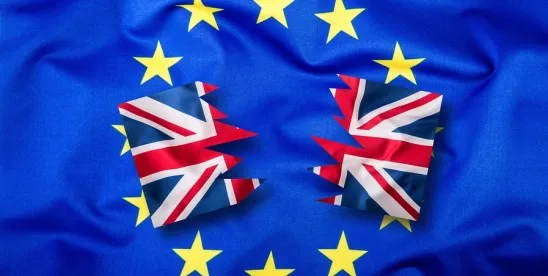The UK Government has proposed changes to the procurement regime for public sector contracts in the UK. The proposals mark a radical divergence from the European procurement regimes post Brexit. The proposals are set out in a green paper entitled “Transforming Public Procurement” (the Green Paper) published on December 15, 2020. The Green Paper invites responses from interested organizations and the consultation will end on March 10, 2021.
IN DEPTH
The Green Paper sets out a series of proposals for consultation that are intended to shape the future of public procurement in the United Kingdom for many years to come. The stated aim of the proposals is to speed up and simplify procurement processes, deliver value for money and give small businesses, charities and social enterprises the opportunity to innovate in public service delivery.
Shortly after the publication of the Green Paper and after months of intense negotiations, the EU and the UK agreed the Trade Co-operation Agreement (the TCA), which applied with effect from January 1, 2021. The TCA frames the economic relationship between the European Union and the United Kingdom and seeks to create a level playing field for open and fair competition and sustainable development. A key objective of the TCA is to guarantee access to EU and UK suppliers and requires the UK to maintain many aspects of the EU public procurement remedies’ regime. This approach will make it difficult for the UK to diverge from EU public procurement rules in the same manner as anticipated in the Green Paper.
The Green Paper proposals would, if implemented, represent a considerable shift in public procurement in the UK, in theory giving significant greater discretion of authorities in relation to their public procurement processes and reducing the scope of bidders to challenge procurement decisions. However, many of the proposals may be constrained by the subsequent Trade Co-operation Agreement, through which the UK has committed to maintaining key aspects of the existing EU procurement regime, for example for remedies.
Key changes proposed in the Green Paper are set out in the table below.
|
AREA |
CURRENT REGIME |
GREEN PAPER PROPOSALS |
|
Regulatory Regime |
· The UK regime is currently derived from EU law and comprises: – Public Contracts Regulations 2015 – Utilities Contracts Regulations 2016 – Concessions Contract Regulations 2016 – Defence and Security Public Contracts Regulations 2011 · Other miscellaneous freestanding and sometimes overlapping UK regulatory provisions also apply to public procurement, for example NHS procurement regulations. |
· Proposal to consolidate the current regulatory framework into a single set of regulations designed for the UK market and priorities with specific sector parts. · Adoption of streamlined regulatory framework to reduce complexity and overlapping rules. · Development of national strategies and priorities for procurement that will be set out in policy statements from time to time. · New approach to procurement to follow the UK’s membership of the WTO Agreement on Government Procurement (GPA), which will enable British businesses to bid for overseas public sector contracts, and which will also give overseas suppliers the right to bid for UK public sector contracts. |
|
Procurement Principles |
EU Treaty Principles apply: · proportionality · mutual recognition · transparency · non-discrimination · equal treatment |
Similar principles will apply to: · public good (to support national strategies including economic, social, ethical, environmental and public safety) · value for money · transparency · integrity · fair treatment · non-discrimination |
|
Procurement Procedures |
Seven procurement procedures are available: · open procedure · negotiated procedure without prior publication (direct awards) · restricted procedure · competitive dialogue procedure · competitive procedure with negotiation · innovation partnerships procedure · design contests In addition, a regime known as the “light touch regime” applies to health, social care and education services. |
Three procurement procedures are proposed: i. a new competitive flexible procedure (similar to the light touch regime) consistent with procurement principles but with minimal rules, advertised and notified at the beginning and end of procedures, giving buyers the freedom to negotiate and innovate ii. an open procedure for simpler “off the shelf” purchases iii. a procedure comparable with the current negotiated procedure allowing direct awards |
|
Crisis or extreme urgency |
Direct awards (under the negotiated procedure without prior publication) may be used if strictly necessary in extreme urgency unforeseeable by the contracting authority. |
· New gateway criteria to justify the use of a limited tendering procedure by contracting authorities in circumstances that amount to less than an extreme urgency due to unforeseeable events. · The concept of “crisis” is subject to consultation and the proposal suggests that a Minister for the Cabinet Office would have the powers to declare a “crisis”. |
|
Evaluation |
Tenders evaluated to determine which is the “most economically advantageous tender” (MEAT). |
Tenders to be evaluated to determine which is the “most advantageous tender” (MAT) to encourage buyers to place emphasis on non-financial considerations, including national strategies and standards of behaviour. This might include the supplier’s previous record and their environmental strategy. |
|
Open and Transparent Contracting |
· Use of prior information and transparency notices to promote open and transparent contracting. · Centralised and semi-centralised initiatives have been adopted over time to make the public procurement exercise more connected. These include tools and services such as: – Contracts Finder – Supplier Registration Services. – Digital Market Place. |
· Creation of a more coherent and less fragmented system. · Publish pipelines of planned procurements and commercial activity (looking forward at least 18 months in advance). · Increased transparency by requiring contracting authorities to implement the Open Contracting Data Standard (international standard for the publication of information relating to the planning, procurement and implementation of public contracts). · Establish a single digital platform for supplier registration. · Centrally managed list of debarred suppliers. |
|
Procurement Challenges and Remedies |
· Procurement challenges brought through the courts. · Pre-contractual and post-contractual remedies and measures. · No applicable caps on damages available. · Standstill letter provided following selection of preferred bidder. |
· Tailored process to speed up challenges. · Review system. · Consider tribunal system for low value claims and managing on-going issues in procurement procedures. · Capping level of damages available · Remove standstill letter. |
|
Healthcare Services |
· The Public Contracts Regulations 2015 (PCR) apply to all contracts for healthcare services entered into by the NHS bodies that are “contracting authorities”. · The PCR’s “light touch regime” allows NHS bodies to determine their own procurement procedures within specified parameters. · Other freestanding regulations – the National Health Service (Procurement, Patient Choice and Competition (No.2)) Regulations 2013 (PPCC2 Regulations) apply to contract award procedures to ensure good practice in procurement of healthcare services; to protect the rights of patients to make choices regarding NHS treatment; and to prevent anti-competitive behaviour. |
Whilst the Green Paper states that it does not consider the procurement of healthcare services, it is clear that the proposals will have an impact on how healthcare services as well as other services related to healthcare will be procured by public healthcare bodies in the United Kingdom. For example, the Green Paper provides that the “light touch regime” will be removed. |




 />i
/>i
